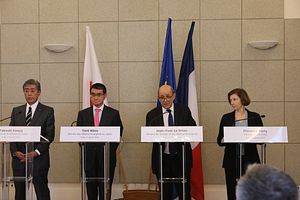In recent years, across both the administrations of French President François Hollande and now Emmanuel Macron, France has sought to deepen its footprint in the Indo-Pacific region. Last week, in another marker of Paris’ sustained interest in this region, the foreign and defense ministers of France and Japan met in Brest, France, for their fifth “two-plus-two” round of defense and security talks.
The talks took place between Japanese Foreign Minister Taro Kono, Defense Minister Takeshi Iwaya, and French Foreign Minister Jean-Yves Le Drian and Defense Minister Florence Parly. At the conclusion of the talks, the two sides released a lengthy joint statement underlining joint areas of concern in the region and around the world.
Notably, the two sides have set up plans to hold a comprehensive maritime dialogue later this year, which could lead to greater Franco-Japanese military cooperation in the Pacific. France maintains military forces in the Pacific. In 2017, the French Navy joined the U.S. Navy, Japanese Maritime Self-Defense Force, and the British Royal Navy for multinational drills off the coast of the U.S. territory of Guam.
Both Tokyo and Paris have voiced an interest in maintaining freedom of navigation in the Indo-Pacific region, expressing concern indirectly about China’s growing maritime assertiveness in regions like the East and South China Sea. To this end, at the conclusion of Friday’s talks, the French and Japanese officials, in their joint statement, reiterated their strong opposition to “unilateral actions heightening tension” in disputed waters in Asia.
In the South China Sea, France has maintained a position similar to that of the United States and conducted quiet freedom of navigation operations and presence operations with its navy near features occupied by China and other claimants. In 2016, Le Drian, then France’s defense minister, told regional security experts at the Shangri-La Dialogue in Singapore that France would support “regular and visible” patrols by the European Union in the South China Sea.
“Several times per year, French navy ships cross the waters of this region, and they’ll continue to do it,” Le Drian noted at the time. Since 2015, the Japanese Maritime Self-Defense Force has regularly transited the South China Sea, though it has not conducted its own freedom of navigation operations.
During Friday’s bilateral talks, the French and Japanese sides agreed to hold regular bilateral military exercises between their armed forces. It isn’t clear if the two might consider holding naval drills in the South China Sea; the Japanese Maritime Self-Defense Force has joined the United States, its treaty ally, for bilateral exercises in the South China Sea before.
France’s interest in the Indo-Pacific is not accidental. 1.5 million French citizens live in French overseas territories and departments the Indo-Pacific region—with an additional 200,000 in various states in the region—and Paris maintains nearly 9 million square kilometers of exclusive economic zone in the region, making France’s EEZ the second largest in the world.
Outside of maritime security issues, the French and Japanese officials discussed other regional security issues, including North Korea. The two sides agreed to fully implement existing United Nations Security Council resolutions toward Pyongyang until the dismantlement of its nuclear weapons program.

































